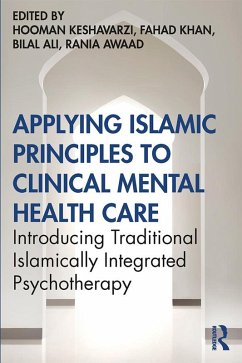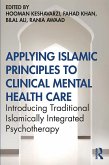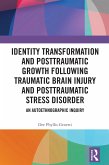Applying Islamic Principles to Clinical Mental Health Care (eBook, PDF)
Introducing Traditional Islamically Integrated Psychotherapy
Redaktion: Keshavarzi, Hooman; Awaad, Rania; Ali, Bilal; Khan, Fahad
45,95 €
45,95 €
inkl. MwSt.
Sofort per Download lieferbar

23 °P sammeln
45,95 €
Als Download kaufen

45,95 €
inkl. MwSt.
Sofort per Download lieferbar

23 °P sammeln
Jetzt verschenken
Alle Infos zum eBook verschenken
45,95 €
inkl. MwSt.
Sofort per Download lieferbar
Alle Infos zum eBook verschenken

23 °P sammeln
Applying Islamic Principles to Clinical Mental Health Care (eBook, PDF)
Introducing Traditional Islamically Integrated Psychotherapy
Redaktion: Keshavarzi, Hooman; Awaad, Rania; Ali, Bilal; Khan, Fahad
- Format: PDF
- Merkliste
- Auf die Merkliste
- Bewerten Bewerten
- Teilen
- Produkt teilen
- Produkterinnerung
- Produkterinnerung

Bitte loggen Sie sich zunächst in Ihr Kundenkonto ein oder registrieren Sie sich bei
bücher.de, um das eBook-Abo tolino select nutzen zu können.
Hier können Sie sich einloggen
Hier können Sie sich einloggen
Sie sind bereits eingeloggt. Klicken Sie auf 2. tolino select Abo, um fortzufahren.

Bitte loggen Sie sich zunächst in Ihr Kundenkonto ein oder registrieren Sie sich bei bücher.de, um das eBook-Abo tolino select nutzen zu können.
This volume introduces traditional Islamically integrated psychotherapy (TIIP). The book introduces the basic foundations of TIIP, then delves into the writings of early Islamic scholars to provide a richer understanding of Islamic literature about mental health.
- Geräte: PC
- ohne Kopierschutz
- eBook Hilfe
- Größe: 39.15MB
Andere Kunden interessierten sich auch für
![Applying Islamic Principles to Clinical Mental Health Care (eBook, ePUB) Applying Islamic Principles to Clinical Mental Health Care (eBook, ePUB)]() Applying Islamic Principles to Clinical Mental Health Care (eBook, ePUB)45,95 €
Applying Islamic Principles to Clinical Mental Health Care (eBook, ePUB)45,95 €![Identity Transformation and Posttraumatic Growth Following Traumatic Brain Injury and Posttraumatic Stress Disorder (eBook, PDF) Identity Transformation and Posttraumatic Growth Following Traumatic Brain Injury and Posttraumatic Stress Disorder (eBook, PDF)]() Dee Phyllis GenettiIdentity Transformation and Posttraumatic Growth Following Traumatic Brain Injury and Posttraumatic Stress Disorder (eBook, PDF)51,95 €
Dee Phyllis GenettiIdentity Transformation and Posttraumatic Growth Following Traumatic Brain Injury and Posttraumatic Stress Disorder (eBook, PDF)51,95 €![Asia-Pacific Perspectives on Intercultural Psychology (eBook, PDF) Asia-Pacific Perspectives on Intercultural Psychology (eBook, PDF)]() Asia-Pacific Perspectives on Intercultural Psychology (eBook, PDF)39,95 €
Asia-Pacific Perspectives on Intercultural Psychology (eBook, PDF)39,95 €![Forensic Psychological Assessment in Immigration Court (eBook, PDF) Forensic Psychological Assessment in Immigration Court (eBook, PDF)]() Barton Evans IIIForensic Psychological Assessment in Immigration Court (eBook, PDF)40,95 €
Barton Evans IIIForensic Psychological Assessment in Immigration Court (eBook, PDF)40,95 €![Cyberpsychology and Society (eBook, PDF) Cyberpsychology and Society (eBook, PDF)]() Cyberpsychology and Society (eBook, PDF)43,95 €
Cyberpsychology and Society (eBook, PDF)43,95 €![The Psychology of Slow Living (eBook, PDF) The Psychology of Slow Living (eBook, PDF)]() Elliot CohenThe Psychology of Slow Living (eBook, PDF)39,95 €
Elliot CohenThe Psychology of Slow Living (eBook, PDF)39,95 €![Women's Mental Health Across the Lifespan (eBook, PDF) Women's Mental Health Across the Lifespan (eBook, PDF)]() Women's Mental Health Across the Lifespan (eBook, PDF)42,95 €
Women's Mental Health Across the Lifespan (eBook, PDF)42,95 €-
-
-
This volume introduces traditional Islamically integrated psychotherapy (TIIP). The book introduces the basic foundations of TIIP, then delves into the writings of early Islamic scholars to provide a richer understanding of Islamic literature about mental health.
Dieser Download kann aus rechtlichen Gründen nur mit Rechnungsadresse in A, B, BG, CY, CZ, D, DK, EW, E, FIN, F, GR, HR, H, IRL, I, LT, L, LR, M, NL, PL, P, R, S, SLO, SK ausgeliefert werden.
Produktdetails
- Produktdetails
- Verlag: Taylor & Francis eBooks
- Seitenzahl: 326
- Erscheinungstermin: 26. Juli 2020
- Englisch
- ISBN-13: 9781000096965
- Artikelnr.: 59786718
- Verlag: Taylor & Francis eBooks
- Seitenzahl: 326
- Erscheinungstermin: 26. Juli 2020
- Englisch
- ISBN-13: 9781000096965
- Artikelnr.: 59786718
- Herstellerkennzeichnung Die Herstellerinformationen sind derzeit nicht verfügbar.
Hooman Keshavarzi, Psy.D is currently an assistant professor at Ibn Haldun University (Istanbul, Turkey), adjunct faculty at Hartford Seminary, a fellow of the International Association of Islamic Psychology and the Executive Director and Founder of Khalil Center. Fahad Khan, Psy.D is a faculty member at Concordia University Chicago and College of DuPage, a fellow of the International Association of Islamic Psychology, and serves as an editor for the Journal of Muslim Mental Health . Bilal Ali is a religious consultant and president of the Board of Directors at Khalil Center and the liaison for the Department of Hadith and academic advisor at Darul Qasim. Rania Awaad, MD is a clinical associate professor of psychiatry at Stanford University School of Medicine, and the director of the Muslim Mental Health Lab and Wellness Program, and co-director of the Diversity Clinic. She is also the regional director of Khalil Center Bay Area.
Part I: Foundations of Traditional Islamically Integrated Psychotherapy (TIIP) 1. Foundations of Traditional Islamically Integrated Psychotherapy (TIIP) 2. The Role of the TIIP Therapist: Scope of Practiced and Proposed Competencies Part II: Introducing the Islamic Intellectual Heritage 3. Islamic Psychology: A Portrait of its Historical Origins and Contributions 4. Framing the Mind
Body Problem in Contemporary Neuroscientific and Sunni Islamic Theological Discourse Part III: Case Formulation and Assessment 5. Quantitative and Qualitative Assessment of the Ontological Domains of the Psyche in TIIP 6. Dreams and Their Role in Islamically Integrated Mental Health Practice Part IV: Treatment of the Domains of the Human Psyche 7. Emotionally Oriented Psychotherapy 8. Use of the Intellect (`aql) as a Cognitive Restructuring Tool in an Islamic Psychotherapy 9. Behavioral ( Nafs
n
) Therapy: Character Development and Reformation 10. Spiritually ( R
h
n
) Focused Psychotherapy
Body Problem in Contemporary Neuroscientific and Sunni Islamic Theological Discourse Part III: Case Formulation and Assessment 5. Quantitative and Qualitative Assessment of the Ontological Domains of the Psyche in TIIP 6. Dreams and Their Role in Islamically Integrated Mental Health Practice Part IV: Treatment of the Domains of the Human Psyche 7. Emotionally Oriented Psychotherapy 8. Use of the Intellect (`aql) as a Cognitive Restructuring Tool in an Islamic Psychotherapy 9. Behavioral ( Nafs
n
) Therapy: Character Development and Reformation 10. Spiritually ( R
h
n
) Focused Psychotherapy
Part I: Foundations of Traditional Islamically Integrated Psychotherapy (TIIP) 1. Foundations of Traditional Islamically Integrated Psychotherapy (TIIP) 2. The Role of the TIIP Therapist: Scope of Practiced and Proposed Competencies Part II: Introducing the Islamic Intellectual Heritage 3. Islamic Psychology: A Portrait of its Historical Origins and Contributions 4. Framing the Mind
Body Problem in Contemporary Neuroscientific and Sunni Islamic Theological Discourse Part III: Case Formulation and Assessment 5. Quantitative and Qualitative Assessment of the Ontological Domains of the Psyche in TIIP 6. Dreams and Their Role in Islamically Integrated Mental Health Practice Part IV: Treatment of the Domains of the Human Psyche 7. Emotionally Oriented Psychotherapy 8. Use of the Intellect (`aql) as a Cognitive Restructuring Tool in an Islamic Psychotherapy 9. Behavioral ( Nafs
n
) Therapy: Character Development and Reformation 10. Spiritually ( R
h
n
) Focused Psychotherapy
Body Problem in Contemporary Neuroscientific and Sunni Islamic Theological Discourse Part III: Case Formulation and Assessment 5. Quantitative and Qualitative Assessment of the Ontological Domains of the Psyche in TIIP 6. Dreams and Their Role in Islamically Integrated Mental Health Practice Part IV: Treatment of the Domains of the Human Psyche 7. Emotionally Oriented Psychotherapy 8. Use of the Intellect (`aql) as a Cognitive Restructuring Tool in an Islamic Psychotherapy 9. Behavioral ( Nafs
n
) Therapy: Character Development and Reformation 10. Spiritually ( R
h
n
) Focused Psychotherapy







